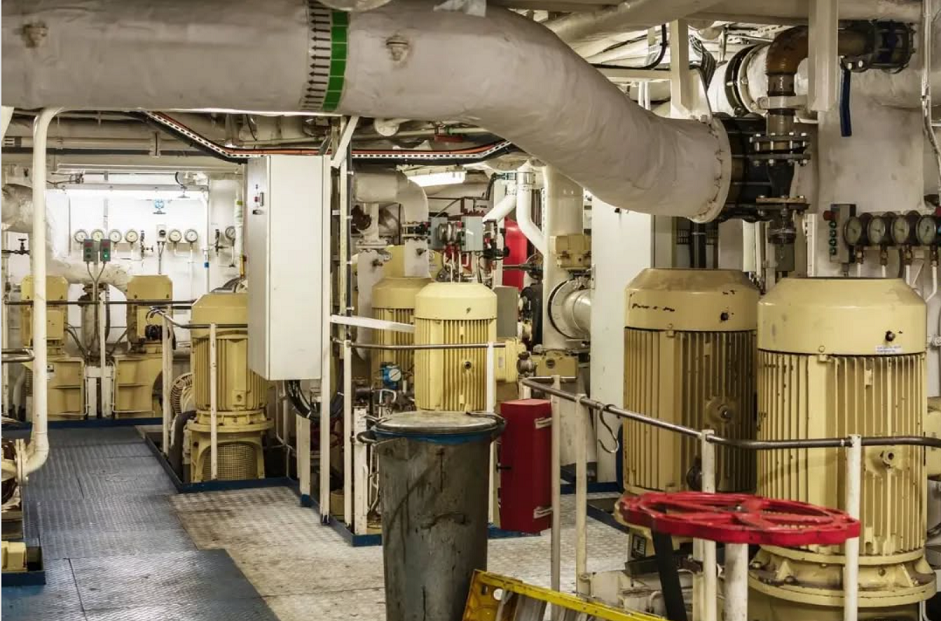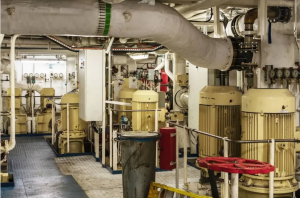Pumps play a crucial role in a ship’s engine room, ensuring the smooth operation of various systems, including fuel supply, cooling, lubrication, and ballast control. Proper knowledge of these pumps is essential for maritime professionals, as they are fundamental to maintaining the ship’s safety, efficiency, and overall performance.
In this article, we will explore frequently asked questions related to ship pumps and provide a comprehensive educational guide.
How Many Types of Pumps Are in an Engine Room?
A ship’s engine room contains various types of pumps categorized based on their function and working principle. The main types include:
- Centrifugal Pumps – Used for general water circulation (e.g., cooling water, ballast water, sea water).
- Reciprocating Pumps – Used for high-pressure applications, such as fuel injection.
- Gear Pumps – Commonly used in lubrication and fuel transfer systems.
- Screw Pumps – Efficient in handling viscous fluids like heavy fuel oil.
- Diaphragm Pumps – Used for bilge and sludge discharge.
Each of these pumps is designed for specific shipboard operations, ensuring reliable fluid movement.
What Are the Different Types of Pumps in Ships’ Engine Rooms?
Shipboard pumps are classified based on their applications:
1. Cooling Water Pumps
- Maintain optimal temperatures for the engine by circulating seawater or freshwater.
- Types: Main Engine Cooling Pump, Jacket Water Pump.
2. Fuel Pumps
- Transfer fuel from storage tanks to engines and boilers.
- Types: Fuel Transfer Pump, Fuel Injection Pump.
3. Lubrication Pumps
- Ensure smooth operation of moving engine parts by supplying lubricating oil.
- Types: Main Lubrication Pump, Emergency Lubrication Pump.
4. Bilge and Ballast Pumps
- Remove excess water from ship compartments (bilge pumps) and control ship stability (ballast pumps).
- Types: Bilge Pump, Ballast Pump, Sludge Discharge Pump.
5. Fire and Emergency Pumps
- Provide high-pressure water for firefighting and emergency situations.
- Types: Fire Pump, Emergency Fire Pump.
These pumps ensure the safety and efficiency of maritime operations, preventing mechanical failures and environmental hazards.
What Are the Different Types of Fuel Pumps in Ships?
Fuel pumps are classified based on their specific function in fuel handling:
- Fuel Transfer Pump – Moves fuel from storage tanks to settling tanks.
- Fuel Booster Pump – Ensures proper fuel pressure before injection.
- Fuel Injection Pump – Delivers fuel into the engine’s combustion chamber under high pressure.
- Purifier Feed Pump – Supplies fuel to purifiers, removing contaminants before use.
Proper maintenance and monitoring of fuel pumps are essential to prevent engine failure and enhance fuel efficiency.
What Are the Three Main Types of Pumps?
Pumps are generally categorized into three fundamental types based on their operating mechanism:
- Centrifugal Pumps – Use rotational energy to move fluids, commonly found in cooling and ballast systems.
- Positive Displacement Pumps – Deliver a fixed volume of liquid per cycle, including gear, screw, and reciprocating pumps.
- Jet Pumps (Ejectors) – Use high-velocity fluid to create suction, commonly used in bilge and ballast operations.
Each type serves a unique purpose, ensuring smooth fluid management in different shipboard systems.
How Many Pumps Are in Ships?
The number of pumps on a ship varies depending on its size, type, and function. A large vessel can have more than 50 pumps, categorized into:
- Engine Room Pumps – Lubrication, fuel, cooling, and bilge pumps.
- Cargo Pumps – Used on tankers for loading/unloading liquid cargo.
- Deck and Firefighting Pumps – Fire and emergency pumps for safety.
Each pump has a specific role, contributing to the vessel’s overall efficiency and operational reliability.
Pumps are an essential component of a ship’s machinery, responsible for fluid management, safety, and operational stability. From engine cooling to fuel transfer and emergency firefighting, these pumps ensure smooth sailing and regulatory compliance. For maritime professionals, understanding ship pumps is vital for maintenance, troubleshooting, and efficient vessel operations. If you’re pursuing a career in maritime engineering, acquiring in-depth knowledge of pump types and functions is a fundamental step toward professional excellence.


